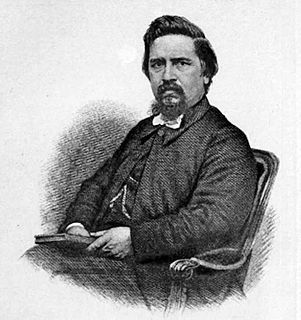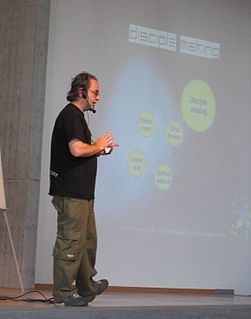A Quote by C. S. Lewis
It takes all sorts to make a world; or a church. This may be even truer of a church. If grace perfects nature it must expand all our natures into the full richness of the diversity which God intended when He made them, and Heaven will display far more variety than Hell.
Related Quotes
I say unto you with all the soberness I can, that we stand in danger of losing our liberties, and that once lost, only blood will bring them back; and we of this church will, in order to keep the Church going forward, have more sacrifices to make, and more persecutions to endure than we have yet known. If the conspiracy comes here it will probably come in its full vigor and there will be a lot of vacant places among those who guide and direct, not only this government, but also this Church of ours.
It is possible to evangelize the world in this generation, if the Church will but do her duty. The trouble is not with the heathen. A dead Church will prevent it, if it is prevented. Why should it not be accomplished? God will have all men to be saved and come unto the knowledge of the truth. The resources of the Church are boundless. Let the will of the Church be brought into line with the will of God, and nothing will be found to be impossible. May God grant it!
Has God no living church? He has a church, but it is the church militant, not the church triumphant. We are sorry that there are defective members, that there are tares amid the wheat. . . . Although there are evils existing in the church, and will be until the end of the world, the church in these last days is to be the light of the world that is polluted and demoralized by sin. The church, enfeebled and defective, needing to be reproved, warned, and counseled, is the only object upon earth upon which Christ bestows His supreme regard.
If churches saw their mission in the same way, there is no telling what might happen. What if people were invited to come tell what they already know of God instead of to learn what they are supposed to believe? What if they were blessed for what they are doing in the world instead of chastened for not doing more at church? What if church felt more like a way station than a destination? What if the church’s job were to move people out the door instead of trying to keep them in, by convincing them that God needed them more in the world than in the church?
Being the church that Jesus intended means that we must participate in God’s eternal purposes for his world. Renewal means more than reinventing ourselves; it means rediscovering the primal power of the Spirit and the gospel already present in the life of the church—reconnecting with this purpose and recovering the forgotten ways. This purpose and potential have always been there, but individuals and communities have largely lost touch with them.
The condition of the church may be very accurately gauged by its prayer meetings. So is the prayer meeting a grace-ometer, and from it we may judge of the amount of divine working among a people. If God be near a church, it must pray. And if He be not there, one of the first tokens of His absence will be slothfulness in prayer.
The world could not long ignore a holy church. The church is not despised because it is holy: it is despised because it is not holy enough. There is not enough difference between the people inside the church and those outside to be impressive. A church in which saints were as common as now they are rare would convict the world, if only by contrast. Sanctity cannot be ignored. Even a little bit is potent. So far from the gates of hell prevailing against it, it hammers on their triple steel.
And so one may be without connection with any church, and even without connection with any established religion, and yet be in spirit, hence in reality, a much truer Christian than hosts of those who profess to be His most ardent followers, as indeed Jesus Himself so many times says. "By their fruits ye shall know them," said He. "Not every one that saith unto me, Lord, Lord, shall enter into the kingdom of heaven; but he that doeth the will of my Father which is in heaven."
Nothing in the church makes people in the church more angry than grace. It's ironic: we stumble into a party we weren't invited to and find the uninvited standing at the door making sure no other uninviteds get in. Then a strange phenomenon occurs: as soon as we are included in the party because of Jesus' irresponsible love, we decide to make grace "more responsible" by becoming self-appointed Kingdom Monitors, guarding the kingdom of God, keeping the riffraff out (which, as I understand it, are who the kingdom of God is supposed to include).
Multitudes of people who expect to go to Heaven will go to a Hell of torment. Thousands of "good" people, "moral" people, church members, even church workers - yes, and, alas, even prophets, priests and preachers - will find themselves lost when they expected to be saved, condemned when they expected approval, cast out of Heaven when they expected to be received into eternal bliss. That is the explicit meaning of the words of our Lord... (see: Matt 7:21-23.]
Aestheticism and radicalism must lead us to jettison reason, and to replace it by a desperate hope for political miracles. This irrational attitude which springs from intoxication with dreams of a beautiful world is what I call Romanticism. It may seek its heavenly city in the past or in the future; it may preach 'back to nature' or 'forward to a world of love and beauty'; but its appeal is always to our emotions rather than to reason. Even with the best intentions of making heaven on earth it only succeeds in making it a hell - that hell which man alone prepares for his fellow-men.
In at least one country where homosexual activists have won major concessions, we have even seen a church pastor threatened with prison for preaching from the pulpit that homosexual behavior is sinful. Given these trends, The Church of Jesus Christ of Latter-day Saints must take a stand on doctrine and principle. This is more than a social issue - ultimately it may be a test of our most basic religious freedoms to teach what we know our Father in Heaven wants us to teach.
Any church which forsakes the regular and uniform for the periodical and spasmodic service of God, is doomed to decay; any church which relies for its spiritual strength and growth entirely upon seasons of "revival," will very soon have no genuine revivals to rely on. Our holy God will not conform His blessings to man's moods and moral caprice. If a church is declining, it may require a "revival" to restore it; but what need was there of its declining?




































